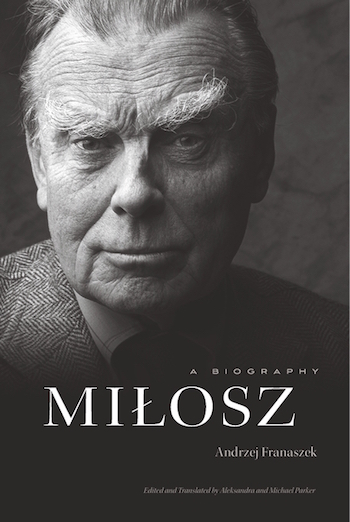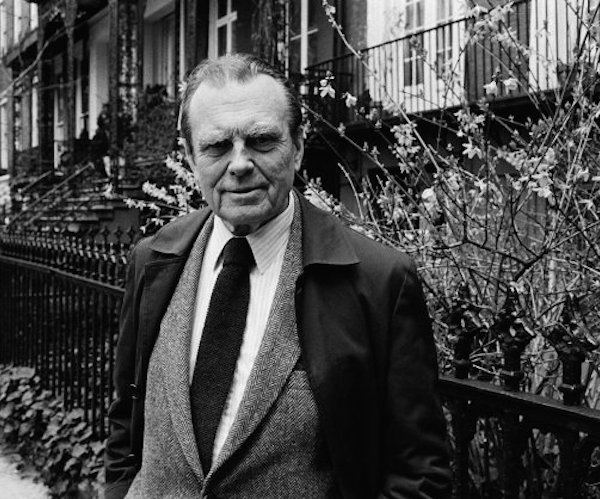Book Review: Polish Poet Czesław Miłosz — Master of the Telling Detail
For a reader without the reference points of mid-twentieth century Lithuania and Poland, this deeply researched biography can be a slog.
Miłosz, A Biography by Andrzej Franaszek, edited and translated by Aleksandra Parker and Michael Parker. Belknap Press of Harvard University Press, 544 pages, $35.
By Debra Cash

In the cold winter of 1944/ 1945, a young couple had taken up residence in a country manor in Goszyce, a village on the outskirts of Krakow, along with at least two dozen intellectuals, actors, writers, and friends who were fleeing the chaos and violence of German occupation. “States were falling, countries passed away/Chimeras of the human mind besieged us,/And made people perish or sink into slavery” the man, a poet, would later remember. When a troop of soldiers approached, the inhabitants had to strain their ears to discern what language they were speaking to identify whether they were the Wehrmacht or the Red Army. (It was, in fact, the Russians.)
The place was plundered and before those who had sought refuge together scattered, the young woman offered a toast. She reportedly said “We are all going our own ways, but to make it nice for you, since it will be some time before Czesław gets his Nobel Prize, let’s drink to it now.”
The couple was Janka Dluska and Czesław Miłosz, and the Nobel Prize would have to wait until 1980, where the award citation described him as a writer “who with uncompromising clear-sightedness voices man’s exposed condition in a world of severe conflicts.”
Andrzej Franaszek’s deeply researched biography plunges into those conflicts without saying much original, or even revealing, about the works that those conflicts produced. A literary critic who already had written extensively about Miłosz’ younger colleague Zbigniew Herbert, delving into Miłosz’s life must have been an obvious choice. Yet for a reader without the reference points of mid-twentieth century Lithuania and Poland, the biography can be a slog, and makes one grateful to the editor, who must have recommended the appendix mapping the chronology of Miłosz’ life against the tumult of the political arena.
Miłosz (1911-2004) had a life that encompassed the best, and nearly worst, that his century had to offer. His paradisiacal childhood in the Lithuanian woods near Wilno (Vilna) made him, at the end of his life, imagine that they spoke Lithuanian in Heaven; the intense intellectual ferment — and unacknowledged egotism — of his youth as a not particularly talented law student; work in broadcasting, early literary acclaim (when he was 25, some were already calling him the greatest living poet writing in Polish), and then the shifting fortunes of the war that began in September 1939 with the German invasion of Poland; the cynical, practical decision to claim stability as a diplomatic bureaucrat and attaché under Communist authorities and then the choice of political asylum and an émigré status in France; separation from his wife and sons and lots of extramarital affairs in which at least some of his lovers were driven to distraction; and ultimately exile and hospitality in a sinecure at UC Berkeley where he developed both deep friendships and retained his sense of European superiority, as if the Pacific sunshine could not possibly mitigate the grim truths of the century he had experienced.
Reference by reference, obscure figure by obscure figure, Franaszek tracks it all. His dutiful telling comes off as dull when set against the flare of Miłosz’ own language in excerpts selected from his memoir (Native Realm), novel (Issa Valley), poetry and (most valuably) unpublished letters now held at Yale. When Franaszek interpolates images of landscape and community, he is on steady ground (and I can’t be the first one to flash on the similarity of this work to the language of Isaac Babel). He has an easy familiarity with the who and the what of topics like the Polish emigre community in Paris (and what each of Miłosz’ acquaintances did later in life) and the details of military operations and the conditions for obtaining certain types of transit documents and visas. One day, someone will need to know this.
The personal and psychological is a bit more shaky, especially when the incidents were written about by Miłosz decades later. In 1935, the young Miłosz had argued that a poem could not be treated as identical to a journalist’s report, but his biographer does not accept that as a limiting factor. It’s dangerous to assume that the assertions of memoir, recollected in tranquility, are unequivocally true — but Franaszek is consistently credulous. More, even when he uses the word “hints” and refers to Miłosz’s novel as semi-autobiographical, he seems to presume that its details represent fact.
And Franaszek makes his own suspect elisions. I snorted out loud on page 16 (of more than 500 pages) when he writes “During the meal little Czeslaw’s eyes remained constantly focused on his beautiful young aunt, Gabriela Kunat, an early indication of how frequently and intensely he would be attracted to the female face and form.” It was 1914. Miłosz was three years old.
Yet, as Franszek plumbs the literary record to rearrange the poet’s associations in a rough chronology, readers can discern the talent, careerism, and sheer bullheadedness that made Miłosz the writer he became. A child of the gentry, he retained a patrician detachment even as he threw his lot in with the “people” and the artistic poor, and he was often his own harshest critic. (One might say damning critic, because he retained a lifelong belief in Satan as a real and literary figure.) We may not care, anymore, about which philosophical systems and high-minded literary agendas mid-20th century young and idealistic middle European intellectuals claimed as their guiding stars. Unlike his contemporaries, we probably don’t need to judge whether Miłosz was a craven collaborationist with the communists, or whether there were other, more honorable choices than Miłosz’s “pact with the devil.” Nonetheless, the fact that this all mattered to them, and mattered enough to create and break friendships and create the conditions for exile, is a story worth telling.

Czesław Milosz — in this bio readers can discern the talent, careerism, and sheer bullheadedness that made him the writer he became.
Miłosz’s poetic language developed in a context in which words proved to be a relatively stable element amid, and despite, constantly shifting national borders and his own peregrinations. As his friend and translator Robert Haas would write in an appreciation when Miłosz turned 80, “he grew up in a province on the fringes of the Russian Empire where the gentry spoke Polish, the peasants Lithuanian, the currents of Yiddish, Ukrainian, and Belorussian also played through the mixed culture of the old Polish-Lithuanian grand duchy, with its strong Roman Catholicism and its underlayer of folk paganism.” His ear was tuned to different tonalities, and all his life Miłosz felt that he learned best, most deeply, by translating everything from the Gospels to Robert Browning.
Franaszek doesn’t offer many critical readings — you won’t learn much about Polish poetic practice from this book — but it’s clear that mastering form, like the sonnets he began writing at 13, or the stanzas he built line by line over the course of many days, was another way to master himself and his surroundings. Literature was a means of survival that, on one occasion, takes on a thrilling metaphorical power: one of Miłosz’s ways of making enough money to feed himself in 1939 was pulling books from the rubble of a bombed out library in Nazi occupied Warsaw.
What Miłosz did have — and it seems that it was his talent from his earliest days — was an ability to concentrate on the telling detail, and to honor the specificity of what he called the “whole, concrete, material, sensual world.” (That is one reason I love his writing and wanted to read this biography in the first place.) In peacetime and in war, and in peace again in countries across oceans, language was his one homeland. He was faithful to the mother tongue before which, he wrote, he set out “little bowls of colors.”
As he wrote in The Sun
Whoever wants to paint the variegated world
Let him never look straight up at the sun
Or he will lose the memory of things he has seen.
Only burning tears will stay in his eyes.
Let him kneel down, lower his face to the grass,
And look at light reflected by the ground.
There he will find everything we have lost:
The stars and the roses, the dusks and the dawns.
Debra Cash, a founding Senior Critic and Board member of The Arts Fuse, is Executive Director of Boston Dance Alliance.
Tagged: A Biography, Andrzej Franaszek, Czesław Miłosz. Polish Literature, Harvard University Press
